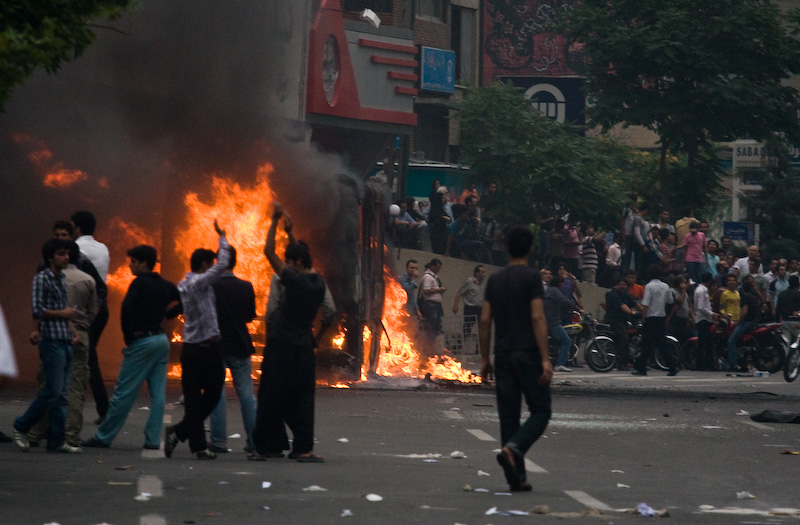In November 2019, a flurry of nationwide protests gripped Iran in response to a sudden governmental decision to raise the price of petrol. In response to the protests, that the ensuing crackdown led to hundreds of deaths, resulting from the deliberate use of lethal force, and to the arrest of more than 7,000 men, women and children as young as 10 years old within a short span of days. While some were released, many of those detained remain incarcerated, having been denied access to lawyers or visits from family members. The Amnesty International has reported from a range of eyewitness accounts that some detainees have been subjected to torture, including through beatings and floggings.
Since the uprising, the Iranian regime has continued to use of arbitrary detention, torture and ill-treatment of prisoners as central tenets of its internal security policy. Described by Amnesty International as crimes against humanity, Iran has remains unwavering towards criticism by the west’s denunciations of human rights violations within the country. Tehran’s attitude remains unaffected despite criticism by the EU as well especially in light of the arrests of dual EU-Iranian nationals. It is evident that the Iranian government is unlikely to be persuaded from its course, particularly when its distrust of the western regimes remains at its peak after the collapse of the nuclear deal. .
A failure on part of the EU?
The EU’s response to such developments in Iran is emblematic in the case of Rouhallah Zam, founder of the popular Telegram channel Amadnews, and a French resident who was executed on December 12, 2020. Convicted on charges of corruption along with other misdeeds, Zam ultimately faced a total number of 17 charges which were upheld on December 8, 12 days before his execution.
The EU, in response condemned the execution and postponed the Europe-Iran Business Forum. However, the organizers of the event said they looked forward to holding the conference soon, adding: “European and Iranian policymakers continue to engage in the necessary dialogue to establish the appropriate conditions for effective economic diplomacy.”
This demonstrates a lack of conviction to confront Tehran on its policies at least towards the dual citizens, a domain where the west can rightfully intervene. Tara Sepehri Far, Iran researcher at Human Rights Watch commented that in cases of the death penalty; “fair trial and due process were absent, rendering the proceedings a travesty of justice.”? However, despite these condemnations and increased sanctions, there seems little inclination on the part of Iran to alter their course, as there is an assumption within the Iranian regime that relations will not be affected much over the long term.
Tehran’s attitudes towards the anti-Iran resolution adopted by the European Parliament have been dismissive, with the Head of the Iranian Judiciary’s High Council for Human Rights stating that the European countries are now involved in killing dozens of sick Iranian children due to their targeted efforts to prevent Iranian children from accessing medicine.
Commenting on the executions, the National Council of Resistance of Iran (NCRI) noted that “such criminal executions [are intended] to create an atmosphere of terror, to intimidate its internal factions, and to thwart the eruption of popular uprisings.” Therefore, it is likely that they will continue to be central in Iranian domestic security policy irrespective of the stance taken by the EU or other international institutions.
The Human Cost
Past the political considerations are the far-reaching human costs. Amid a global pandemic, where Iran according to health ministry officials lost one person per 10 minutes as a result of COVID-19, detainees are under considerable risk. Rather than adhering to calls for temporary release of at-risk prisoners, Iranian security forces have in effect doubled down on them. Iran Human Rights Monitor (Iran HRM), a renowned rights group, recorded at least 260 arbitrary arrests in November of 2020, indicating a continued drive to supress and incarcerate those who are considered a “threat” to the current regime. These threats targeted for arbitrary arrest and detention are journalists, students and human rights defenders, including minority rights and labour rights activists, and people from ethnic minority groups. The treatment of these prisoners has garnered much attention with a continuing recourse to degrading punishments for incarcerated people, further legitimised by governmental officials, including the supreme leader and head of the judiciary who have labelled protesters and human rights defenders as “villains” and “rioters” and associated protesters with foreign powers.
Amnesty International in its report “Trampling Humanity” investigated the actions of the Iranian authorities against those arrested in connection with the protests in 2019 and concluded that they committed widespread patterns of serious human rights violations, including arbitrary detention, enforced disappearance, torture and other ill-treatment, and flagrant breaches of the right to a fair trial,”. It is evident that the Iranian authorities view this heavy hand approach as the best means to supress any criticism against the regime, regardless of its human consequences.

